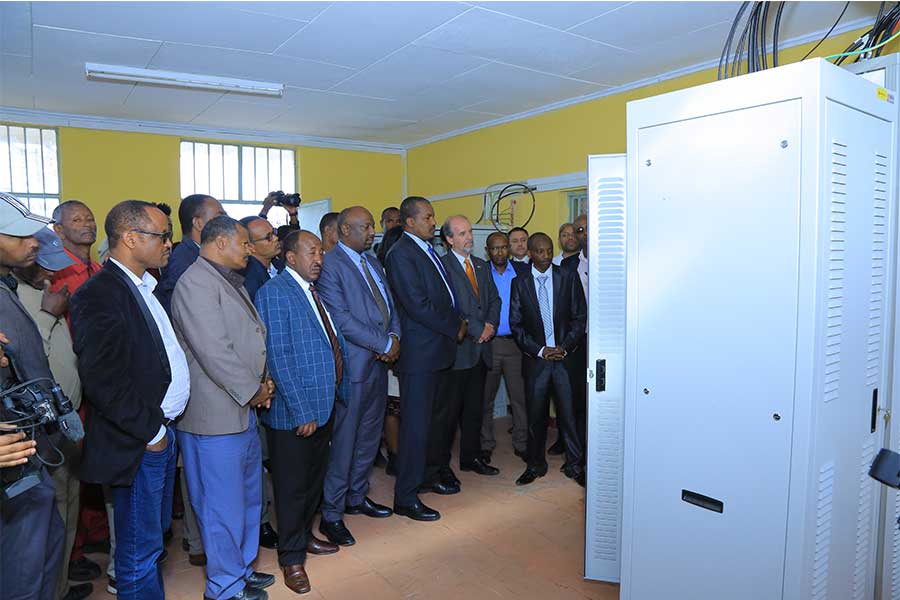
Viewpoints | Nov 09,2024
Mar 6 , 2021
Loners sitting in coffee shops and hotel lobbies and accessing the internet through the Wi-Fi service they just bought are continuing the tradition of socialising over coffee – in their own way. This time the socialising is taking place over the digital space, perhaps between people that are half a world away from each other, writes TADESSE TSEGAYE(seetadnow@gmail.com), a polyglot with experience in multicultural-cum-institutional settings in resources management.
Not long ago, I met one of my high school mates after ages of not seeing each other at one of the three-star hotels in town. Close to us were youngsters, flipping through their phones and laptops. People that age are a common sight in places such as this, where they come for the Wi-Fi service.
My friend and I were meanwhile immersed in an argument about coffee. As long as coffee beans were roasted and brewed, it was coffee, according to her. I did not agree. Coffee is part of a culture, a tradition. It is a tool to facilitate social harmony. It is more of an element to a ceremony that brings neighbours closer to talk about personal lives, social issues and matters of the community.
The loners staring at their laptops and smartphones, sipping coffee with barely a thought to it, are missing the point. They do not have the conversations, discussions and debates that should accompany coffee drinking.
Even for modern living, where coffee is roasted and brewed using a machine and sold in a cafe as a commodity – a far cry from traditional coffee ceremonies – there used to be more to drinking coffee. At least, there was someone to drink with, not just the phone. Cafes and hotel lobbies had an inviting chatter accompanying them. This is declining steadily.
In our talks with my friend, we reminisced about an event in school that had a bearing on my understanding of the connection between coffee and socialising. Our high school sophomore Amharic teacher staged a floor for debating. We were in two groups. I led one group; and the other was led by a very dynamic boy.
I weighed in with my argument. My prep was neither that good nor coherent, admittedly. As I rested my case, my counterpart raised a hand and criticised that I had relied on too many examples.
The defence came from another kid on my team with a jibe against my counterpart. Reinforcing it with an Amharic adage garnished with humour, he had the whole classroom roll with laughter. Then, my counterpart hit back with a trademark, organised, academic-laden argument. I was contemplating revenge. He hardly finished his opinion as I raised my hand to tackle him mid-argument.
His often stern look got emotionally charged with my inane punchy remark. Once again, it was garnished with raucous laughter from my group. He waved his index finger at me in a temper tantrum, and he started to walk to his seat.
The discussion did not go forward much after that point. The flair of that episode swayed the sole adjudicator – our teacher. The rating had a bearing on our Amharic final semester result. While it ended up being the last school formal debate I had, such discussions and debates were considered necessary for academic learning and mental maturity.
The episode also reminds me of discourse over social media. There are high and low notes. There are humour, insults, disagreements and back-and-forths. Perhaps, those kids sipping their coffees while they stare at their laptops and smartphones were not missing the conversation part of the tradition of coffee drinking.
As many early tech entrepreneurs envisaged, the internet is becoming the town square for the global village. Thus, knowledge is disseminated and debated on a grander scale. It could be a conversation between strangers, "a gift and a sport of sorts, a chance for warmth, banter, blessings and humour,” that Rebecca Solnit, author, used to describe spoken words.
The loners sitting in coffee shops and hotel lobbies and accessing the internet through the Wi-Fi service they just bought should not be underestimated. With them continues the tradition of coffee and conversations, only this time the latter is taking place over the digital space, perhaps between people who are half a world away from each other.
PUBLISHED ON
Mar 06,2021 [ VOL
21 , NO
1088]


Viewpoints | Nov 09,2024

Radar | Jun 04,2022

Viewpoints | May 25,2024

Radar | Apr 01,2024

Radar | Apr 30,2024

Editorial | Aug 19,2023

Fortune News | May 02,2020

Fortune News | Oct 24,2020

Fortune News | Sep 28,2019

Radar | Aug 30,2025

Dec 22 , 2024 . By TIZITA SHEWAFERAW
Charged with transforming colossal state-owned enterprises into modern and competitiv...

Aug 18 , 2024 . By AKSAH ITALO
Although predictable Yonas Zerihun's job in the ride-hailing service is not immune to...

Jul 28 , 2024 . By TIZITA SHEWAFERAW
Unhabitual, perhaps too many, Samuel Gebreyohannes, 38, used to occasionally enjoy a couple of beers at breakfast. However, he recently swit...

Jul 13 , 2024 . By AKSAH ITALO
Investors who rely on tractors, trucks, and field vehicles for commuting, transporting commodities, and f...

Nov 1 , 2025
The National Bank of Ethiopia (NBE) issued a statement two weeks ago that appeared to...

Oct 25 , 2025
The regulatory machinery is on overdrive. In only two years, no fewer than 35 new pro...

Oct 18 , 2025
The political establishment, notably the ruling party and its top brass, has become p...

Oct 11 , 2025
Ladislas Farago, a roving Associated Press (AP) correspondent, arrived in Ethiopia in...